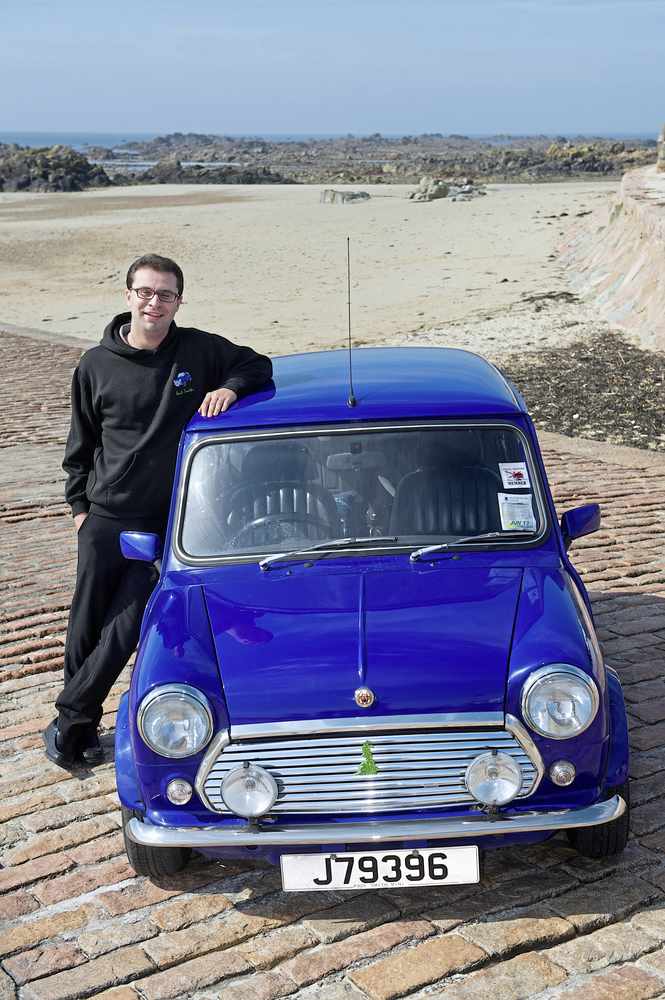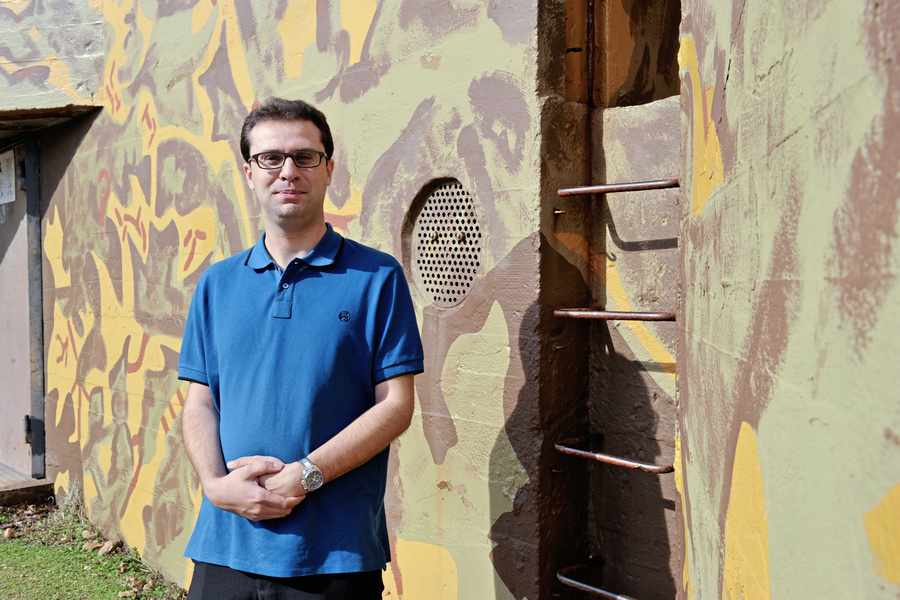‘I’ve never liked big crowds or being in large buildings ever since my school days,’ says Seb (26).
‘Some other school children used to call me “weird” simply because I was a bit different from them.
‘They used to tease me because every time an aircraft flew over, I would look up at the sky. That was because I had a big interest in planes and often when one flew overhead, I knew what type of aircraft it was. I could also identify quite a few planes just from the sound of their engines.
‘Instead of watching cartoons, I would watch aircraft videos and I collected hundreds of model planes.’
Seb, who owns the original blueprints for Jersey’s airport, says he preferred the company of older people.
‘People of my own age and peer group could never really understand me. I got picked on at school and I would be in floods of tears when I got back home.
‘There were three months when I didn’t even attend school because I felt so uncomfortable going in. I had depression and anxiety.’
Seb, who grew up in St Clement and still lives in the parish, was unable to benefit from any continuity in his secondary school education.

He did not enjoy his time at Le Rocquier and moved to Blacks Academy, but for his GCSEs he studied the alternative curriculum at an education centre in St Saviour.
Seb’s time at school was not without its successes – he entered for his GCSE art exam a year early and achieved a B, and some of his work was exhibited at the Arts Centre and the Welcome Centre at St Thomas’ Church – where he sold three of his paintings to States members.
‘The artist Mackenzie Thorpe really inspired me. When he was at school, people were horrible to him and he used to get the slipper across the backside or a ruler across the knuckles.
‘He was dyslexic and the teachers didn’t understand dyslexia in his day so he found school very difficult, but he realised he had a flair for art and could express himself through art.
‘He used dramatic colours and I loved using dramatic colours to create bold, vibrant paintings of sunsets.’
Seb also enjoyed history and geography lessons, but in general, he saw few rays of light and felt ill at ease during his school years.
He had already been diagnosed with anxiety disorder a few years before taking his GCSEs, but he knew that this diagnosis could not fully account for the difficulties he had experienced in fitting in at school.
‘I didn’t feel completely satisfied with that diagnosis and at around the age of 15 I started to think there was even more to it than anxiety.’
Anxiety and depression are common in adults with undiagnosed autism, and unbeknown to Seb and his family, he was living with a form of the condition – albeit at the lower end of the spectrum.
According to Autism Jersey, people who are on the spectrum are at a social disadvantage. They are more likely to suffer exclusion at school and to be under-employed in adulthood – and that was exactly Seb’s experience.
After completing his GCSEs, he went job-searching – to no avail.
‘I started to do a lot of training through work-related schemes.
‘I had several unpaid work placements and one temporary position that wasn’t paid.
‘I knew I wanted some type of office job, but I couldn’t get one.’
Seb’s self-esteem plummeted and despite having one-on-one sessions with a number of counsellors, his autism continued to go undetected.
‘I felt a lot of frustration because I’d been to various counsellors to talk about how I felt and they couldn’t really put a finger on what was wrong.
‘They said “that’s life” and told me to get on with it. It was a very non-sympathetic approach.
‘It’s easy for people to read out of a textbook to you, but unless you’ve experienced the same problems then it’s hard for counsellors to be on the same page.
‘I used to leave those sessions thinking, “Do they really understand where I’m coming from?”‘
He says he could fill a book with the number of negative reactions he received from students and counsellors, and recalls one extremely dispiriting encounter with a job skills coach.
‘A job counsellor once told me to “go away and grow a pair”, and I remember leaving the room feeling terribly depressed.
‘I also had another experience where an employment team tried to intimidate me. They kept trying to make me feel that I was the awkward one, that I was hard to help get into employment and that I had put up all the barriers.
‘I was feeling really low so I went to my doctor and told him that as I was getting older, I was feeling worse in many ways so my doctor referred me to Jersey Talking Therapies.’
JTT is a States-run initiative that provides cognitive therapies for over-18s who are suffering from common mental health issues, including anxiety and depression.
‘I had an assessment and at the end, the lady who assessed me asked how I would feel about having a diagnostic test for autism. I said I’d give it a go as I had nothing to lose.
‘In the meantime, she put me on a mindfulness course for six weeks.’
Mindfulness is the psychological process of paying attention to your thoughts and feelings, without placing too much importance on them. Scientific research indicates that the practice of mindfulness is strongly linked to improved mental wellbeing.
‘I learned how the brain and its thought patterns work, and I practised mindfulness meditation. Even today, I find it really helps.’
For Seb, mindfulness was a small step in the right direction, but it was the team at Jersey Autism who identified his underlying issue.
‘At Jersey Autism they did various tests. For example, they gave me a book which only had pictures in it.
‘They asked me to explain what was happening in the book, and there was a test where you picked six items out of ten and you’d have to tie those items together by telling a brief story.
‘My mum also had to fill out a form which required her to write about what I was like as a child, whether I had any special rituals and if I collected certain objects.
‘They made another appointment for me to see a specialist, who came over from Bristol.
‘He spoke to me, looked at what I struggled at and what I excelled at, and he came to the conclusion that I had high-functioning Asperger’s Syndrome.’
Asperger’s Syndrome is a form of autism, at the lower end of the autism spectrum.
People with high-functioning Asperger’s Syndrome tend to have above average intelligence, but may struggle with issues related to social interaction and communication.
Seb says he experienced myriad emotions when he finally received his diagnosis.
‘I immediately felt a wave of all sorts of emotions. There was happiness knowing that I finally had an answer for why I was feeling the way I did. Before, when I got really low, I wondered what was wrong with me.
‘But there was frustration too – I think if I had got my diagnosis a lot earlier, it would have made my life a lot easier.’
Seb’s happiness levels have improved immeasurably since his diagnosis.
He says he has made lots more friends than he had before, and he has been working full-time as a secretarial administrator for Jersey Employment Trust – a charity which helps people with special needs and long-term health conditions find and maintain employment in the Island – for two-and-a-half years.
‘Initially I was a client of JET, but I later applied for a job to work for them. I got a phone call back the next day, had an interview which went really well and got the job.
‘That was in October 2014 and I’ve never looked back since.
‘A lot of things I would have struggled with back at school, I’ve been able to turn around and use them as a strength in my work and everyday life.’
Seb insists that people with Asperger’s Syndrome should be given the chance to showcase their strengths – strengths born from a meticulous mindset.
‘Employers should not think of it as a disability. They should drop the first three letters and focus on the person’s ability,’ says Seb, whose mother Carrol is a retired nurse and whose dad, Chris, works for Liberation Brewery.
‘You could call autism my superpower nowadays! I’m very analytical and you can give me a list of names or phone numbers, ask me to go through it and cross reference it with another list, and I’d be very efficient at doing that.
‘Where someone else might be pulling their hair out saying, “This task is doing my head in”, I’d quite happily do it and do it well.’
Since his diagnosis, there has been no holding Seb back, both at work and in whatever leisure pursuit he has chosen to explore.
As a proud owner of two Mini cars, he regularly indulges his passion for the famous marque by meeting up with like-minded enthusiasts at the Classic Mini Breakfast Club gatherings.
‘With the Breakfast Club we meet once every three weeks and we normally cruise down to St Catherine’s. We get breakfast, have a good old chat and keep the Minis on the road.
‘I have a red Mini Cooper and a rare limited edition signature blue Paul Smith Mini, which was created as a result of the car manufacturer’s collaboration with the fashion designer Paul Smith. It’s really stylish and I love it.’
Seb has been a member of the Channel Islands Occupation Society for just over a year – ‘I’ve been helping to restore a mortar bunker down at Corbière with a group of like-minded people’ – and he loves to travel.

China, Italy, Turkey, Egypt and the United States are just some of the countries he has visited to date.
Whether he is travelling the world or cruising along Jersey’s coastal roads in one of his iconic Minis, Seb, who holds the late, great rally driver Colin McRae in high regard, always adheres to the Scotsman’s credo for enjoying life to the full.
‘I loved his driving and one of my favourite quotes of his is: “You’re here for a good time, not a long time”.’
Just as Seb enjoys recalling maxims of merit from his heroes, so the rest of us could learn from his own wise words.
In Jersey, it is estimated that there are 1,000 people on the autism spectrum from a population of almost 100,000.
‘I’d really urge people to remember that once you’ve met one person with autism, you’ve still only met one person because no two people are the same,’ says Seb.
‘Every individual deserves to be treated with respect.’
This month Autism Jersey is encouraging people to do something awesome for autism. For more information, visit www.autismjersey.org






